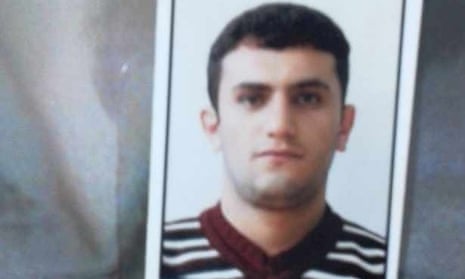Human rights activists have urged Iran to halt the imminent execution of a young man convicted of taking up arms against the state when he was under 18.
Saman Naseem, now 22, is scheduled to be executed on Thursday after being found guilty of moharebeh (enmity against God) for his alleged membership of PJAK, an armed Kurdish opposition group, and alleged involvement in a gun battle with Iran’s Revolutionary Guards near Sardasht, a city in West Azerbaijan province.
Naseem, who was 17 at the time of his arrest in July 2011, appeared on Iran’s state television later that year, saying he had shot at members of the elite military unit. He is being held in Orumiyeh prison in north-west Iran.
Activists said Naseem retracted his confession during his trial and that it was made under duress. Iran has signed the international treaties which prohibit the execution of those convicted of crimes committed when they were juveniles.
Hassiba Hadj Sahraoui, Amnesty International’s deputy director for Middle East and North Africa, called on Iran on Monday to halt the planned execution of Naseem and launch a thorough review of his case.
“Imposing the death penalty on someone who was a child when the alleged crime took place goes against international human rights laws that Iran has committed to respect,” she said.
“This is the reality of the criminal justice system in Iran, which makes a mockery of its own statements that it does not execute children and upholds its obligations under the convention on the rights of the child.”
Iran’s penal code prohibits death penalty for juveniles for offences whose punishment can be administered at the discretion of the judge, such as drug offences. But a death sentence may still be applied if he or she has committed crimes considered to be “claims of God” and, therefore, have mandatory sentences – such as moharebeh, sodomy, rape, theft.
Last week, Amnesty published a letter written by Naseem and sent out of jail, in which he describes in distressing detail his time in prison.
“During the first days, the level of torture was so severe that it left me unable to walk. All my body was black and blue. They hung me from my hands and feet for hours. I was blindfolded during the whole period of interrogations and torture, and could not see the interrogation and torture officers,” he wrote, according to Amnesty.
“They told me that they would kill me right there and would cover my grave with cement. When I wanted to sleep during nights, they would not let me rest by making noises using different devices, including by constantly banging on the door. I was in a state between madness and consciousness. I could not have any contact with my family during this time.”
Human Rights Watch, which has described Naseem’s trial as unfair, said Iran was among a handful of countries known to have executed juveniles in the past five years. The others are Yemen, Saudi Arabia, Sudan and the Hamas authorities in Gaza.
“This is an open-and-shut case since there is no dispute that Saman Naseem was under 18 when security forces arrested him,” said HRW’s Sarah Leah Whitson. “Naseem and his family should have never suffered mental anguish associated with being on death row for months on end, let alone facing imminent hanging.”
Whitson added: “Leaders of PJAK and other armed groups operating in Iran should know that they are as responsible for putting the lives of children like Naseem’s in harm’s way. There is simply no excuse for allowing children to take part in armed activities on behalf of an opposition group.”
